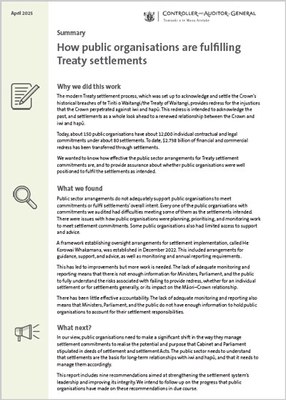Summary of our report
Why we did this work
 The modern Treaty settlement process, which was set up to acknowledge and settle the Crown’s historical breaches of te Tiriti o Waitangi/the Treaty of Waitangi, provides redress for the injustices that the Crown perpetrated against iwi and hapū. This redress is intended to acknowledge the past, and settlements as a whole look ahead to a renewed relationship between the Crown and iwi and hapū.
The modern Treaty settlement process, which was set up to acknowledge and settle the Crown’s historical breaches of te Tiriti o Waitangi/the Treaty of Waitangi, provides redress for the injustices that the Crown perpetrated against iwi and hapū. This redress is intended to acknowledge the past, and settlements as a whole look ahead to a renewed relationship between the Crown and iwi and hapū.
Today, about 150 public organisations have about 12,000 individual contractual and legal commitments under about 80 settlements. To date, $2.738 billion of financial and commercial redress has been transferred through settlements.
We wanted to know how effective the public sector arrangements for Treaty settlement commitments are, and to provide assurance about whether public organisations were well positioned to fulfil the settlements as intended.
What we found
Public sector arrangements do not adequately support public organisations to meet commitments or fulfil settlements’ overall intent. Every one of the public organisations with commitments we audited had difficulties meeting some of them as the settlements intended. There were issues with how public organisations were planning, prioritising, and monitoring work to meet settlement commitments. Some public organisations also had limited access to support and advice.
A framework establishing oversight arrangements for settlement implementation, called He Korowai Whakamana, was established in December 2022. This included arrangements for guidance, support, and advice, as well as monitoring and annual reporting requirements.
This has led to improvements but more work is needed. The lack of adequate monitoring and reporting means that there is not enough information for Ministers, Parliament, and the public to fully understand the risks associated with failing to provide redress, whether for an individual settlement or for settlements generally, or its impact on the Māori–Crown relationship.
There has been little effective accountability. The lack of adequate monitoring and reporting also means that Ministers, Parliament, and the public do not have enough information to hold public organisations to account for their settlement responsibilities.
What next?
In our view, public organisations need to make a significant shift in the way they manage settlement commitments to realise the potential and purpose that Cabinet and Parliament stipulated in deeds of settlement and settlement Acts. The public sector needs to understand that settlements are the basis for long-term relationships with iwi and hapū, and that it needs to manage them accordingly.
This report includes nine recommendations aimed at strengthening the settlement system’s leadership and improving its integrity. We intend to follow up on the progress that public organisations have made on these recommendations in due course.

